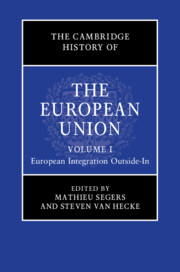Book contents
- The Cambridge History of the European Union
- The Cambridge History of the European Union
- The Cambridge History of the European Union
- Copyright page
- Contents
- Figures
- Contributors to Volume I
- Acknowledgements
- Abbreviations
- Reflections on the History and Historiography of European Integration
- Part I Critical Junctures
- 1 The Emergence of a Divided World and a Divisible West
- 2 European Integration and the Temporary Division of Germany
- 3 Europe, Decolonisation and the Challenge of Developing Countries
- 4 European Integration and Globalisation since the 1970s
- 5 A Europe of Reunification?
- 6 Moderately Failing Forward: The EU in the Years 2004–2019
- Part II Multilateralism and Geopolitics
- Part III Perspectives and Ideas
- Index
- References
4 - European Integration and Globalisation since the 1970s
from Part I - Critical Junctures
Published online by Cambridge University Press: 21 October 2023
- The Cambridge History of the European Union
- The Cambridge History of the European Union
- The Cambridge History of the European Union
- Copyright page
- Contents
- Figures
- Contributors to Volume I
- Acknowledgements
- Abbreviations
- Reflections on the History and Historiography of European Integration
- Part I Critical Junctures
- 1 The Emergence of a Divided World and a Divisible West
- 2 European Integration and the Temporary Division of Germany
- 3 Europe, Decolonisation and the Challenge of Developing Countries
- 4 European Integration and Globalisation since the 1970s
- 5 A Europe of Reunification?
- 6 Moderately Failing Forward: The EU in the Years 2004–2019
- Part II Multilateralism and Geopolitics
- Part III Perspectives and Ideas
- Index
- References
Summary
In 2020, ‘strategic autonomy’ became a buzzword in Brussels. The phrase catches different meanings, ranging from the self-sufficiency of the European Union (EU) to the management of interconnectedness in a globalised world. In EU parlance, ‘strategic autonomy’ is used in a sense that aims to be different from the traditional concepts of sovereignty and power, but should, however, not be read in contradiction with free trade. ‘Strategic autonomy’ seems to have been articulated first by President of the European Council Charles Michel in two speeches in September 2020. But in reacting to the clichés that US President Donald Trump voiced against the EU in January 2017, German Chancellor Angela Merkel had already expressed her desire for European autonomy in declaring that ‘we Europeans have our fate in our own hands’. French President Emmanuel Macron has regularly used the related concept of ‘European sovereignty’ since his speech on Europe at the Sorbonne in 2017. Regardless of the origin and meaning of the phrase, ‘strategic autonomy’ touches therefore on a perennial motif of European integration that largely predates the 2010s, namely the place and role of the EU in a globalising (or globalised) world.
- Type
- Chapter
- Information
- The Cambridge History of the European Union , pp. 106 - 134Publisher: Cambridge University PressPrint publication year: 2023

